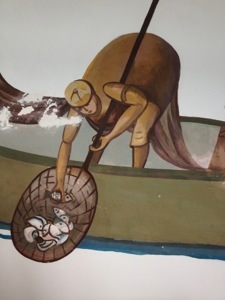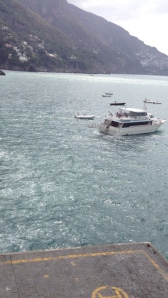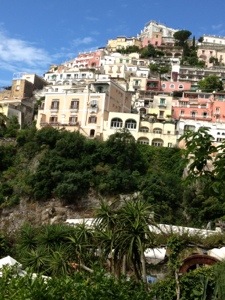
The March 1944 eruption of Vesuvius, by Jack Reinhardt, B24 tailgunner in the USAAF during World War II (Photo credit: Wikipedia)
We woke up early the next day and set out after breakfast, walking through the narrow streets. By 9am, the tourists were already out in force, snaking their way through the alleys. Out on the other side of the town, overlooking the cliffs, the sun had already slipped away, replaced by a cool mist. I thought of the vapourous matter overhanging Mount Vesuvius. Our cab driver had explained to us in great detail about the careful scientific monitoring that took place daily; men with sophisticated electromagnetic instruments. He said that Vesuvius was active, and therefore dangerous, she could blow at any moment. What could anyone do? Life must go on regardless.
We walked without without strain or effort, owing to the coolness. A few boats bobbed up and down upon the waves below. Along the narrow coastline, we were forced to squeeze against the barrier wall so as not to be squashed by passing trucks. At the top of the hill, overlooking the town, we saw a woman and her son. They appeared to be waiting for the red bus that passes along every hour or so. They were twitching with curiosity as we approached; we were the only strangers around, as if not many tourists ventured this far. The young man was silent, but his mother opened up. She was a bit merry, as if she’d been drinking. From afar, she looked like a skinny rock chick; but up close the roots of her hair told a different story.
She wore a humongous amount of jewellery; bracelets that clashed violently when she pointed at a villa nearby. She recommended it as a place to stay, swimming pool and all of that. I didn’t like the look of the place, it was overly guarded, hidden behind a small forest of trees, but I saw the benefit of staying somewhere private, with a pool.
‘Ten Americans arriving next week,’ she told us, ‘they rented it for a month.’
She told us she worked there, as a cook, and that she and son lived in another town, not far from Positano. They were waiting for the red bus to stop off.
I got the name wrong on the gate, thinking it said ‘Mauro’.
‘Not not ‘Mauro’, the woman said, ‘Maura, the villa belongs to an Irish woman called ‘Maura.’
I felt cheated; here I was on a remote hilltop in Southern Italy, and here they were too. Was there no cave I could crawl into? No corner of the earth to hide in? No; as soon as I am in the cave, they will crawl out from beneath the rocks.
“The Irish are everywhere “, I said, “my whole life I have been trying to escape, but the world won’t let me.”
“Oh yes ” she replied brightly “everywhere, Italy, America, Canada, everywhere!” Evidently, she didn’t regard this as a complaint. I looked again at the houses built into the cliffs. If those rocks tumbled, all of those houses would be gone too. This was the Positano way, one for all, all for one; not like me, detached, and broken off from my roots.
“My mother died two years ago,” I said, but the woman was already talking about something else.
Related articles
- Positano, The Amalfi Coast part IV (jacquelynclark.com)








